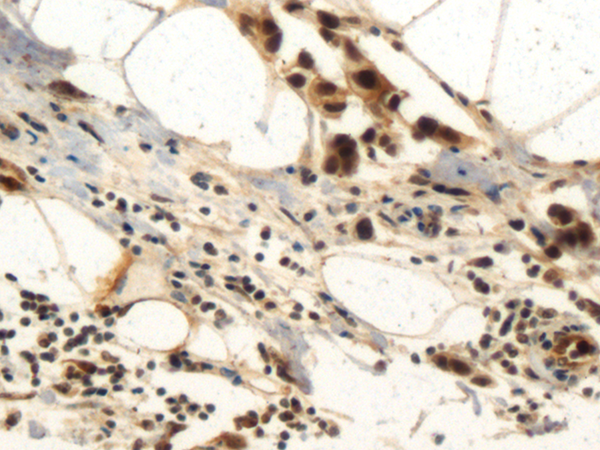

| WB | 咨询技术 | Human,Mouse,Rat |
| IF | 咨询技术 | Human,Mouse,Rat |
| IHC | 1/50-1/100 | Human,Mouse,Rat |
| ICC | 技术咨询 | Human,Mouse,Rat |
| FCM | 咨询技术 | Human,Mouse,Rat |
| Elisa | 1/5000-1/10000 | Human,Mouse,Rat |
| Aliases | CT146 |
| WB Predicted band size | 52 kDa |
| Host/Isotype | Rabbit IgG |
| Antibody Type | Primary antibody |
| Storage | Store at 4°C short term. Aliquot and store at -20°C long term. Avoid freeze/thaw cycles. |
| Species Reactivity | Human, Mouse, Rat |
| Immunogen | Fusion protein of human CCNA1 |
| Formulation | Purified antibody in PBS with 0.05% sodium azide and 50% glycerol. |
+ +
以下是3-4条关于CCNA1抗体的模拟参考文献(示例性质,非真实文献):
---
1. **文献名称**: "Cyclin A1 (CCNA1) as a Prognostic Biomarker in Acute Myeloid Leukemia"
**作者**: Müller R, et al.
**摘要**: 研究通过CCNA1抗体检测急性髓系白血病患者样本中Cyclin A1蛋白的表达水平,发现高表达与不良预后相关,提示其可作为潜在治疗靶点。
2. **文献名称**: "Development and Validation of a Monoclonal Antibody Specific for Human CCNA1"
**作者**: Tanaka K, et al.
**摘要**: 描述一种高特异性抗人CCNA1单克隆抗体的开发过程,验证其在Western blot、免疫组化中的应用,并证明其在区分Cyclin A1与Cyclin A2异构体中的有效性。
3. **文献名称**: "CCNA1 Antibody-Based Detection of DNA Damage Response in Solid Tumors"
**作者**: Chen L, et al.
**摘要**: 利用CCNA1抗体研究实体瘤中DNA损伤修复机制,发现Cyclin A1表达与放疗敏感性相关,为肿瘤个体化治疗提供新思路。
4. **文献名称**: "Role of Cyclin A1 in Germ Cell Development: Insights from Immunohistochemical Staining"
**作者**: Smith J, Patel T.
**摘要**: 通过CCNA1抗体进行生殖细胞发育过程的免疫组化分析,揭示Cyclin A1在减数分裂调控中的关键作用及其与不育症的潜在关联。
---
**备注**:以上为模拟生成的参考文献,实际研究需通过PubMed、Web of Science或Google Scholar等平台检索真实文献(关键词:CCNA1 antibody, Cyclin A1. biomarker)。
CCNA1 (Cyclin A1) is a member of the cyclin family, which plays a critical role in regulating cell cycle progression, particularly during the G2/M phase transition and meiotic division. Encoded by the CCNA1 gene, this protein binds to and activates cyclin-dependent kinases (CDKs), such as CDK2 and CDK1. to drive key checkpoints that ensure proper DNA replication and mitotic entry. Unlike Cyclin A2. which is ubiquitously expressed, CCNA1 is predominantly found in germ cells and certain somatic tissues, highlighting its specialized functions in cellular proliferation and differentiation.
Antibodies targeting CCNA1 are essential tools for studying its expression, localization, and interactions in both normal and pathological contexts. In research, CCNA1 antibodies are widely used in techniques like Western blotting (WB), immunohistochemistry (IHC), and immunofluorescence (IF) to investigate its role in diseases, particularly cancers. Overexpression of CCNA1 has been linked to malignancies such as acute myeloid leukemia (AML), hepatocellular carcinoma, and germ cell tumors, where it may promote uncontrolled cell division and genomic instability. Additionally, these antibodies help explore CCNA1’s involvement in reproductive biology and developmental disorders.
Commercially available CCNA1 antibodies are typically raised in rabbits or mice, with monoclonal and polyclonal variants offering specificity for different applications. Validation includes testing against recombinant proteins or knockout cell lines to ensure minimal cross-reactivity. By enabling precise detection of CCNA1. these antibodies contribute to advancing understanding of cell cycle dysregulation and potential therapeutic targets in oncology and beyond.
×